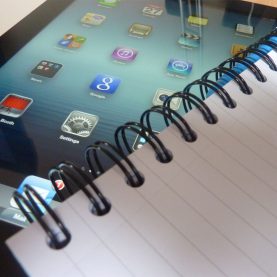
Several nights ago, far past my bed time, I read that: “scientists say nighttime electronics are interfering with Americans’ ability to get a good night’s sleep“. “They’re right,” I thought, and duly put my iPad down. The next morning, I woke up to a headline claiming that: “the iPad 2′s wealth of new features is a boon for tech-hungry classrooms“. “Maybe it’s not so bad”, I concluded as I put it back on my night table. This Manichean response to the ubiquitous role of the iPad in my life captures my ambivalence about the device.
Returning a couple of weeks ago from Birmingham (where I gave a talk to the Renaissance Studies symposium at the University of Alabama), I tapped into the free WiFi at the airport to browse through Reeder (which piggybacks on Google Reader (a Web-based aggregator)). I scanned through posts and articles from my favourite sites, then sent several over to Instapaper so I could read them on the plane. I next opened Instapaper to ensure that all the pages had loaded (and realized that in some cases I had only selected the first page of multi-page articles.) I corrected the problem. I was feeling good.
30,000 feet up, while reading the articles, I tried to annotate them. Inspired by Bill Turkel, I’ve been trying to go all-digital, creating an archive of research articles and notes that I can analyze with software that Bill will talk about.) And this is where things went wrong. I could export articles from Instapaper in a variety of ways – like over to GoodReader (which annotates PDFs), just none that would allow me to do what I wanted – Instapaper only exports text files to GoodReader, not PDFs. Annotating text files in GoodReader means typing in text at the bottom of the document, instead of the relevant paragraph, and as Slate’s John Dickerson recently observed, you can make a cup of tea in the time it takes to cut and paste text across iPad applications, or type into them. Opening up a doc in Pages would have yielded the same frustrating (and error-filled) typing outcome. An easier option was to use Note Taker, but the iPad doesn’t yet support handwriting recognition, so I wouldn’t be much further ahead in my goal to create an all-digital, all-searchable research library. And that’s when I contemplated giving it to the passenger beside me.
Several weeks into iPad 2, and a year after the launch of the original, nearly everything that could be said has been. On the one hand, it’s WalMart, except that you have to buy the building before walking in and making your purchase. It’s a consumption device, not a creative device. On the other hand, it makes surfing the Web while you recline on your couch a joy, and provides new opportunities to share content. And against all odds, it may usher my mother into the computer age. All I can add is my personal experience: its beautiful UI raises expectations that are quickly dashed – it consistently takes me near, but not to, the productively creative spot that I am used to on my laptop.
Which is why I’ve decided to ditch it. Not completely, of course. I’m scheduled to pick up a 3G-enabled iPad 2 tomorrow. And as the mercury rises in southern Ontario you may find my students and me tripping around historic Niagara, researching how best to use it to augment reality – to support our connection to the history all around us. But I have no grand designs for it as a personal productivity device, at least not right now. I’ll let the world, and Apple, sort that out for the next couple of years.
Slate’s John Swansburg recently asked his colleagues to dissuade him of his impulse to give away his iPad. What followed was a conversation about what his journalist friends found the machine to be good – or terrible – for. Digital humanists, Steve Ramsay has recently told us, are people who “make things” (I whole-heartedly agree). Given that the iPad is so bad at creating, should we put it aside as a work device, at least for the short-term? A year after it supposedly changed the game, what do we as digital humanists think of the iPad as a device to support our work?
